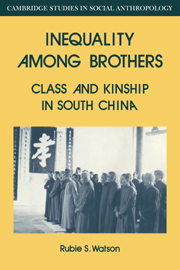Book contents
- Frontmatter
- Contents
- Preface
- Maps
- 1 Introduction
- 2 The development of the Teng lineage: Ha Tsuen's early history
- 3 Lineage organization and ideology
- 4 Economic organization: the land and the market
- 5 Local political organization
- 6 Class differences in Ha Tsuen: the social and cultural dimension
- 7 Marriage, affinity, and class
- 8 Economic and political changes: 1945–1978
- 9 Social and cultural transformations
- 10 Class and kinship
- References
- Glossary
- Index
- CAMBRIDGE STUDIES IN SOCIAL ANTHROPOLOGY
10 - Class and kinship
Published online by Cambridge University Press: 30 October 2009
- Frontmatter
- Contents
- Preface
- Maps
- 1 Introduction
- 2 The development of the Teng lineage: Ha Tsuen's early history
- 3 Lineage organization and ideology
- 4 Economic organization: the land and the market
- 5 Local political organization
- 6 Class differences in Ha Tsuen: the social and cultural dimension
- 7 Marriage, affinity, and class
- 8 Economic and political changes: 1945–1978
- 9 Social and cultural transformations
- 10 Class and kinship
- References
- Glossary
- Index
- CAMBRIDGE STUDIES IN SOCIAL ANTHROPOLOGY
Summary
In previous chapters I have argued that although all of the Ha Tsuen Teng may have been equal “in the eyes of the ancestors,” they were by no means equal in the everyday world of landowning and political power. The Chinese lineage was not an institution dedicated to the pursuit of mutual advantage with all members sharing equally in the benefits or profits. Nor was it simply a tool devised by the landlord-merchants and manipulated by them at will. The relationship between the system of descent and the system of class relations is not so simple. This relationship is best understood not at the level of personal manipulation but as part of a complex of interlocking structures that create the conditions by which one class dominates another.
The concept of class has played a central role throughout this study. Before turning to a detailed discussion of the relation between class and kinship in Ha Tsuen, I would like to briefly explain how I have used the term class and why it seems to me to be useful for this analysis.
Class and class analyses in Chinese society
Control over important resources is crucial to any discussion of class difference and class structure. The ownership of land has always been central to discussions of class relations in rural China.
- Type
- Chapter
- Information
- Inequality Among BrothersClass and Kinship in South China, pp. 168 - 175Publisher: Cambridge University PressPrint publication year: 1985



